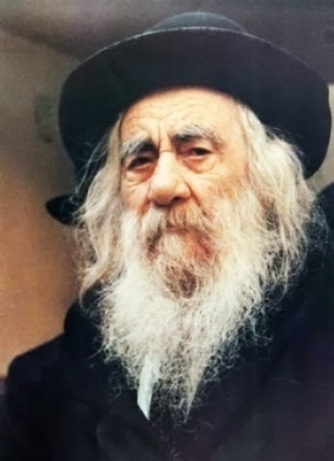Rabbi Yaakov Israel – “The Steipler”
Rabbi Yaakov Israel was born on Tammuz 9, 5659 (1899) in the Russian town of Horon-Steipel (hence the moniker “the Steipler”).
His father, Rav Chaim Peretz Kanievsky, was a Chernobyl Chassid. He died when his son was only 7 years old, and food was hard to come by in the Kanievsky household after his departure. Later, when the Novardoc Yeshiva sent representatives looking for new students, the Steipler’s mother sent him with them and told them, “Take him with you to study in the yeshiva. There he will have something more to eat to satisfy his hunger.” He celebrated his Bar Mitzvah alone at the yeshiva: He received a pair of Tefillin, gave a brief speech, and then returned to his studies.
At the age of 18, he was bestowed the leadership of the Rogatchov Yeshiva. However the Bolshevik revolution was in full swing and Rabbi Yaakov Israel was drafted into the Red Army. He once briefly remarked about this period in his life, saying that because he refused to work on Shabbat, he was forced to pass through a row of soldiers that beat him with their rifle butts. He related that he would never forget the joy he felt for the honor of Shabbat.
Once, when he had to perform night duty in Siberia during a deathly cold night, he refrained from wearing his hood because he feared that it might contain some Shatnez. He managed to survive the night thanks to the indomitable willpower that always characterized him. Yet from that day on, he began to lose his hearing because of what the cold had done to his ears. He managed to get discharged from the army and with some old friends attempted to maintain yeshivas under the new communist regime. Noting the futility and danger of such an initiative, he decided to move to Poland to study at the Bialystok Yeshiva.
His devotion to Torah study quickly garnered him a special place in the yeshiva. Over the course of the years he imposed on himself a rigorous schedule that was quite impressive, studying long hours at a stretch and sleeping a few hours for what amounted to a minimum of rest. As his friends could testify, his bed at the yeshiva was mostly vacant.
In 1925 he published his first book, Sha’arie Tevunah. This book made its way to the Chazon Ish in Vilna. The Chazon Ish didn’t know the author of the book, but reading it was sufficient for him to decide that the author should marry his sister Miriam.
The marriage was in fact celebrated, and Rabbi Yaakov Israel began to teach at the Novardok Yeshiva in Pinsk. A turning point in his life occurred in 1934 when, pressed by the Chazon Ish, he went to settle in Eretz Israel in what was then the tiny village of Bnei Brak. Thus he went from first directing the Novardok Yeshiva to assisting his brother-in-law in running the Chazon Ish Kollel. He continued in this capacity even after the death of the Chazon Ish, assuming the responsibility of lecturing as well. During his final years, he was content to give a shiur on his brother-in-law’s yahrtzeit.
The official responsibility for the yeshiva, as important as it was, nevertheless was far from doing justice to the place occupied by the Steipler. His office was never empty, as it was constantly accommodating yeshiva students and directors of institutions, just as it did businessmen, craftsmen, doctors, industrialists, mothers of families (Ashkenaz as well as Sephardic), and so on. All were searching for a father, a teacher, a counselor, the Tzaddik of the generation.
In his book Birkat Peretz, the Steipler writes that the Patriarch Jacob kept his name even after he was called Israel, for Israel and Jacob refer to two different, yet complimentary aspects of the Jewish people. The Steipler was clearly Yaakov [Jacob] Israel: Israel on one side (battling against celestial forces, consecrating his life to an incessant and demanding spiritual ascent), yet also Jacob (Yaakov – from the Hebrew word ekev, the heel – a person of great simplicity, to whom nothing in the human realm was unfamiliar).
Yet what was the secret to his radiance and influence, devoid as he was of the means of the powerful people of this world? Perhaps it was because he had basically lost, for more than 35 years, his sense of hearing. A painful disability for sure, but also a protection against all the banality, pettiness, and ugliness of our world. Plunged from his early years into a universe in which Torah, Avodah, and Gemiluth Chesed are the real foundations of life, he possessed a true and just view of men and things.

